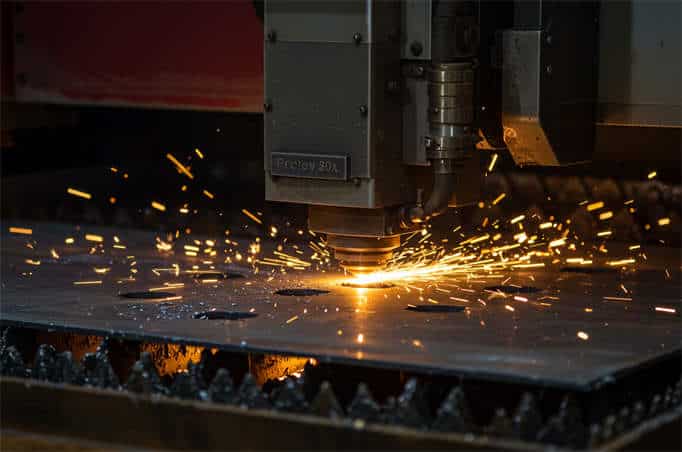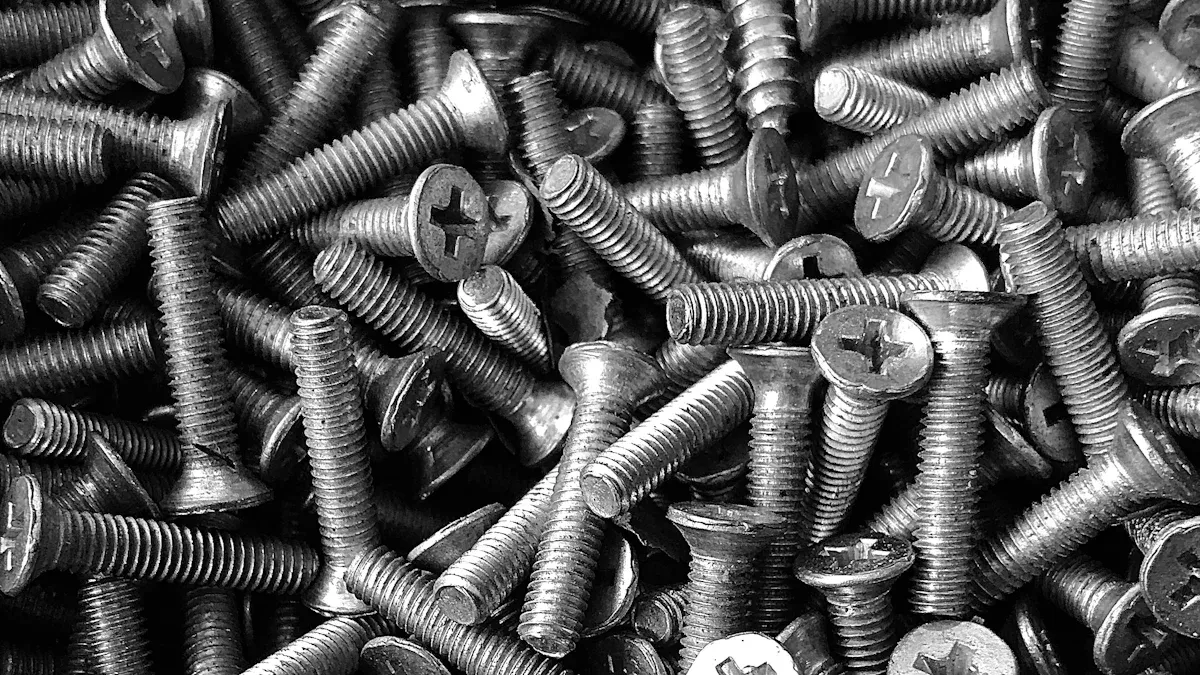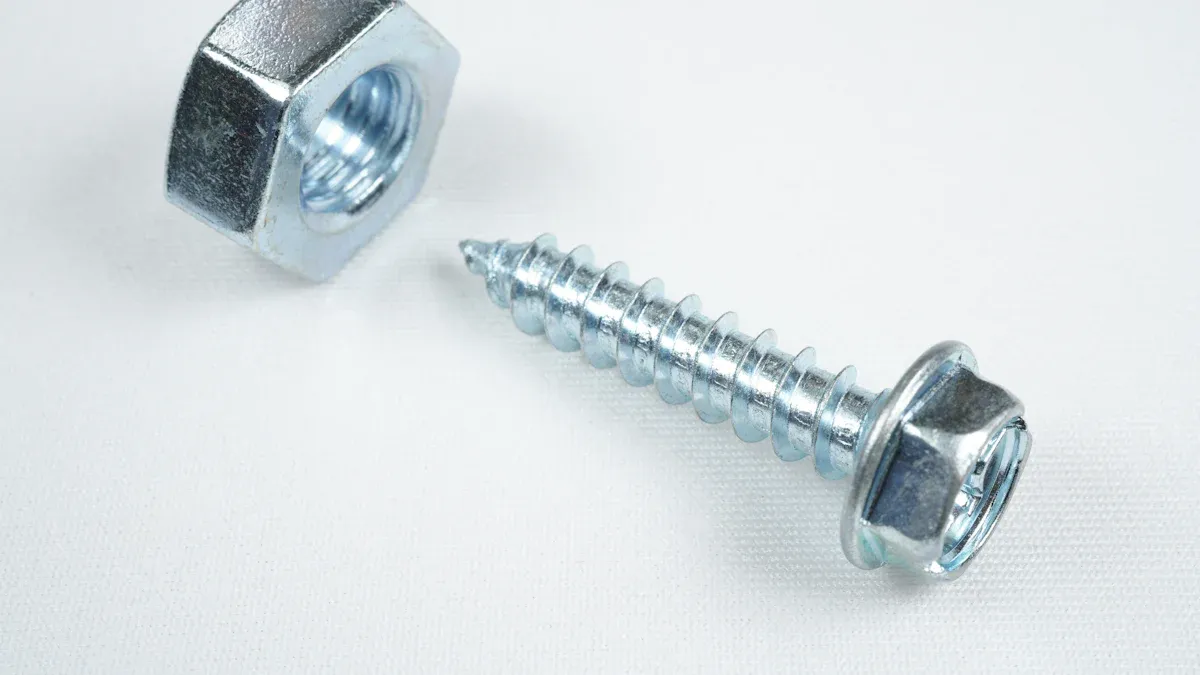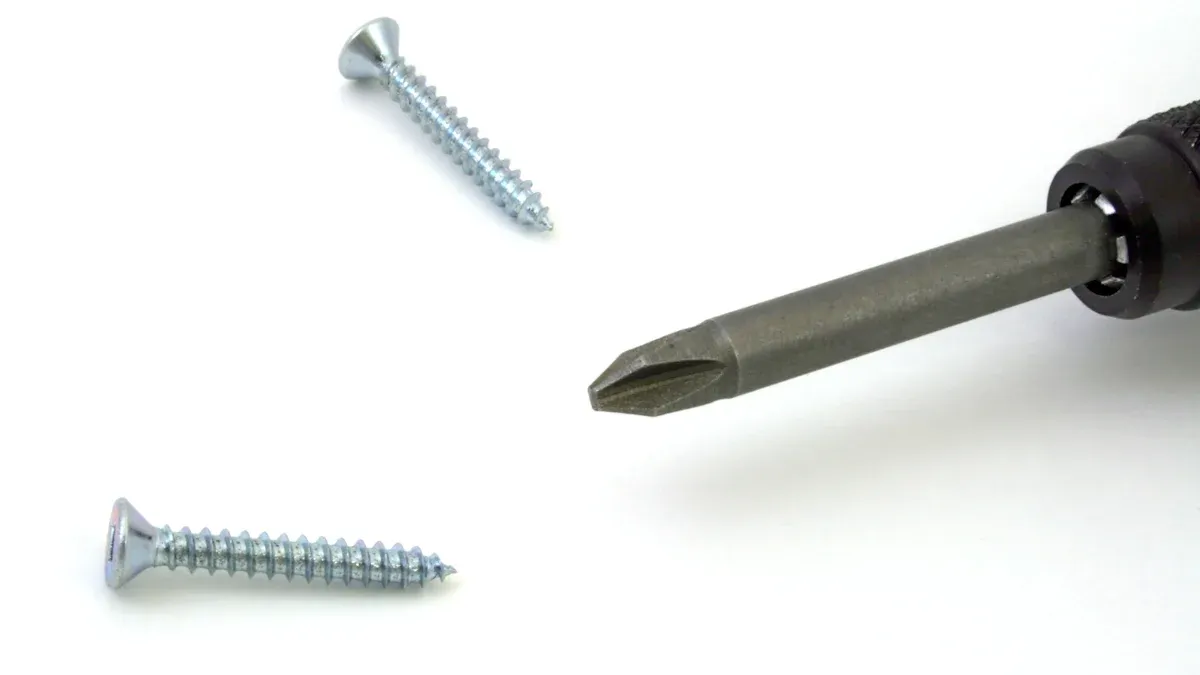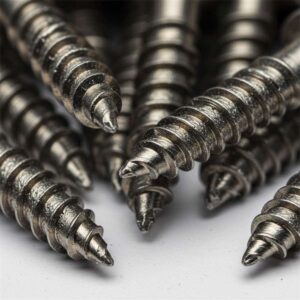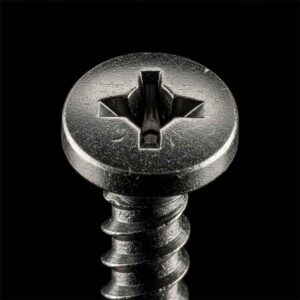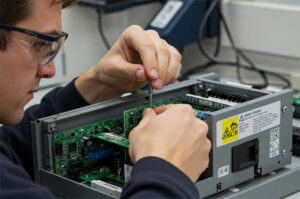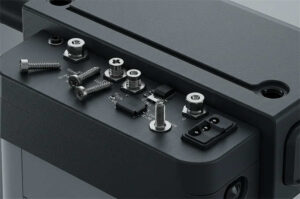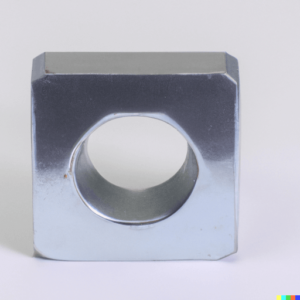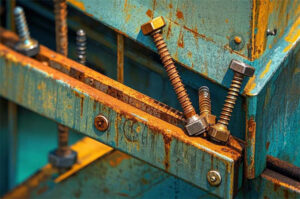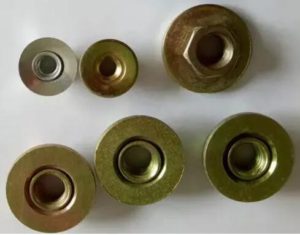You should use an indented slotted hex head screw when you want strong torque and easy installation with a wrench. Phillips screws work best for quick assembly and light to medium torque. Allen screws give you the best choice for tight spaces and high precision. If you need a reliable fastener for metal parts, the 10-32 x 1/2 ft indented slotted hex head machine screw offers solid grip and strength.
Key Takeaways
- Pick indented slotted hex head screws for strong turning power and easy setup. You can use wrenches or flathead screwdrivers with them.
- Use Phillips screws when you need to put things together fast. The cross shape stops slipping. They are good for jobs that need light or medium turning power.
- Choose Allen screws for small spaces where you need to be exact. The hex shape lets you use a lot of turning power. It does not hurt the screw.
- Always use the right tool for the screw you pick. This stops damage and helps you work better and faster.
- Think about what you are building before picking screws. Different jobs need different screws for best results and safety.
Quick Comparison
Screw Types Overview
You will find three main types of screws in most projects. Each type has a unique design and purpose.
- Slotted screws have a single straight groove. You use a flat-head screwdriver to turn this screw.
- Phillips screws show a cross-shaped indentation. This design helps your screwdriver grip better and reduces slipping.
- Allen screws, also called hex socket screws, have a hexagonal hole. You use an Allen wrench to install or remove this screw. The hex shape lets you apply more force without damaging the screw.
Tip: Always match your tool to the screw type. This helps you avoid stripping the head and makes your work easier.
Key Differences
You should know the main differences before you choose a screw for your project.
- Drive Type: Slotted screws need a flat-head tool. Phillips screws require a cross-tip driver. Allen screws use a hex key.
- Torque: Allen screws allow you to use more torque. This means you can tighten them more without slipping. Phillips screws offer medium torque. Slotted screws work best for light to moderate force.
- Application: Use slotted screws for simple jobs or when you want to use basic tools. Phillips screws fit well in quick assembly tasks. Allen screws shine in tight spaces and when you need a strong, secure hold.
- Cam-Out Resistance: Phillips screws resist slipping better than slotted screws. Allen screws resist cam-out the most, so you can use them for high-precision work.
A quick look at these features helps you pick the right screw for your needs. You save time and avoid frustration when you match the screw to your project.
Indented Slotted Hex Head Screws
Features
You will notice that indented slotted hex head screws have a unique design. The slotted head has a straight groove, which lets you use a flat-head tool. The hex shape around the head gives you another way to turn the screw. You can use a wrench or a socket for the hex part. This dual drive system makes these screws very flexible. You can work with them even if you only have basic tools.
The slotted groove helps you start the screw by hand. The hex shape lets you apply more force. You can tighten the screw without slipping. The indented area around the slotted groove helps your tool stay in place. This reduces the chance of stripping the slotted head. The hex design also spreads the force over a larger area. This means you can use these screws in heavy-duty jobs.
Note: You can use both manual and power tools with these screws. This makes them a good choice for many tasks.
Uses
You will find indented slotted hex head screws in many settings. Their strong grip and easy installation make them popular in tough jobs. The slotted and hex features work well in places where you need both speed and strength.
Here is a table that shows where you will most often use these screws:
| Screw Type | Common Uses |
|---|---|
| Hex | Industrial equipment and construction applications |
You will see these screws in machines, metal frames, and building projects. The slotted design lets you start the screw quickly. The hex shape lets you finish tightening with a wrench. This makes them perfect for jobs where you need to switch tools or work in tight spots.
You can use these screws when you need a secure hold. The slotted and hex features help you avoid stripping the screw. You can also remove and reuse these screws if needed. This makes them a smart choice for repairs and upgrades.
10-32 x 1/2 ft Indented Slotted Hex Head Machine Screw
Specifications
When you choose a 10-32 x 1/2 ft indented slotted hex head machine screw, you get a fastener built for strength and precision. This screw uses a hex head, which means you can use a wrench or socket for tightening. The slotted groove lets you use a flat-head screwdriver if you need to. You will find the hex shape on the head makes it easy to grip and turn, even in tight spots.
Here is a table that shows the main specifications for this screw:
| Specification | Details |
|---|---|
| Fastener Type | Machine Screw Hex Head |
| Size Description | #10-32 x 1/2″ (FT) |
| Diameter/Nominal Size | #10 |
| Length | 1/2″ |
| Wrench Size/Across Flats | 0.305-0.312″ |
| Width Across Corners | 0.340″ |
| Head Height | 0.105-0.120″ |
| Thread Pitch | 32 |
| Thread Pitch Type | Fine |
| Thread Direction | Right |
| Thread Coverage | Full |
| System of Measurement | Inch |
| Material | Stainless Steel 18-8 |
| Finish | Plain Finish (No Plating) |
| Head Type | Hex |
| Drive Type | External Hex |
| Average Piece Weight | 0.0050000 lbs. |
You can see that the hex head and fine thread pitch give you a secure fit. The stainless steel material resists rust and adds durability. The 10-32 x 1/2 ft indented slotted hex head machine screw works well in many environments.
Application Scenarios
You will find the 10-32 x 1/2 ft indented slotted hex head machine screw in many projects. The hex head lets you use a wrench for extra torque. The slotted groove gives you another option if you only have a flat-head screwdriver. This screw fits well in metal-to-metal connections, especially when you need a strong hold.
Here are some common ways you can use this screw:
- 🛠️ Assembling machinery: The hex head helps you tighten the screw without slipping. You get a secure fit for moving parts.
- 🏗️ Building metal frames: The 10-32 x 1/2 ft indented slotted hex head machine screw holds metal pieces together. The hex shape spreads force, so you avoid damage.
- 🔧 Repairing equipment: You can remove and reuse this screw. The hex head makes it easy to loosen, even if the screw is tight.
- 🖥️ Mounting electrical panels: The fine thread and hex head give you control. You avoid over-tightening and protect delicate parts.
- 🚗 Automotive work: The hex head lets you work in tight spaces. You can use a socket or wrench for quick installation.
Tip: Always check the wrench size before you start. The hex head on this screw fits a 0.305-0.312″ wrench, so you get the best grip.
You can rely on the 10-32 x 1/2 ft indented slotted hex head machine screw for jobs that need both strength and flexibility. The hex design and slotted groove give you options, so you can work faster and safer.
Phillips Screws
Features
Phillips screw head types look different because they have a cross shape. This shape helps your screwdriver stay in the middle. You do not need to line it up perfectly. You can start the screw with one hand. This makes your job easier. The cross has four arms. You can use more force than with other screw head types. The screwdriver holds the screw well. You can tighten or loosen it without slipping.
Here is a table that shows how Phillips screw head types are different from other screw head types:
| Characteristic | Definition |
|---|---|
| Easy to use | The design centers itself. You can turn the screw even if your screwdriver is at an angle. |
| More torque | The cross shape lets you use more force. You do not slip as much. |
| Resistance to cam out | The design keeps the screwdriver from slipping out. This protects your screw and your project. |
| Availability | You can find Phillips screw head types almost everywhere. You do not need to search long for replacements. |
Tip: Phillips screw head types often have magnetic tips. This helps you hold screws better and work faster.
Uses
You will see Phillips screw head types in many places. People use them in factories, electronics, furniture, and home jobs. You can use them to hang drywall or put up cabinets. They work for wood decks too. Phillips screw head types help you build machines and electronic devices.
Here are some common ways people use Phillips screw head types:
- Hanging drywall in homes and offices
- Attaching ledger boards for decks or shelves
- Installing cabinets in kitchens and bathrooms
- Fastening wood decking for outdoor spaces
- Building furniture and wooden toys
- Assembling electronic enclosures and data center hardware
- Dismantling wood-to-wood connections during repairs
Phillips screw head types help you avoid stripping or breaking the screw. The design pops out if you use too much force. This protects your materials. You can trust these screw head types for quick jobs and careful work.
Allen Screws
Features
Allen screws are easy to spot because of their hexagonal socket. You use an Allen wrench or hex key to install them. These screws fit in small spaces where other tools cannot go. Their small size makes them good for tight assemblies.
- You can tighten Allen screws fast and easily.
- The hex socket stops your tool from slipping.
- These screws can take a lot of force.
- They hold heavy loads without bending.
- The smooth finish makes your project look neat.
- You can take them out and use them again for repairs.
Here is a table that shows the main features:
| Feature | Description |
|---|---|
| Compact Design | Fits in small spaces where other screws do not fit. |
| Enhanced Torque | Hex socket lets you use more force. |
| Aesthetic Appeal | Gives your project a clean, neat look. |
| Strength & Durability | Made to handle lots of stress and shaking. |
| Ease of Maintenance | Simple to remove and reuse without breaking parts. |
Tip: Pick Allen screws if you want a strong grip and a tidy look.
Uses
Allen screws are used in many jobs because they are strong and flexible. Their shape works well when you need a tight fit and a smooth finish. You can use these screws in machines, cars, and electronics.
Here are some industries that use Allen screws:
| Industry |
|---|
| Automotive & Aerospace |
| Construction & Infrastructure |
| Heavy Machinery & Equipment |
| Electronics & Robotics |
| Medical & Marine Engineering |
You might use Allen screws to put together a bike, fix a car, or build a robot. These screws are also good for medical tools and marine gear because they do not rust easily. You can count on them for jobs that need lots of force and a strong hold.
Note: Allen screws are quick to put in and take out, so you finish repairs faster.
Head-to-Head Comparison
Drive Type & Tools
You will see that screw drive types make a big difference in how you work. Each screw drive type needs a specific tool.
- Indented slotted hex head screws use a flathead screwdriver or even a knife. You can also use a wrench or socket for the hex part.
- Phillips screw drive types need a Phillips screwdriver. This tool helps you grip the screw and avoid slipping.
- Allen screw drive types require a hex key. The hex socket fits the tool snugly and helps you turn the screw without damaging the head.
Tool compatibility affects your choice. If you have only basic tools, you may pick indented slotted hex head screws. If you want tamper resistance or need to work in tight spaces, Allen screw drive types work best. Phillips screw drive types are easy to use and help you finish jobs quickly.
Tip: Always match your tool to the screw drive type. This helps you avoid stripping the head and makes installation smoother.
Installation Ease
You will find that installation ease depends on the screw drive types and the tools you use.
- Indented slotted hex head screws let you start with a flathead screwdriver and finish with a wrench. The hex shape gives you extra grip and control.
- Phillips screw drive types center themselves. You do not need to line up the tool perfectly. You can install these screws fast, even with one hand.
- Allen screw drive types fit into small spaces. The hex socket keeps the tool steady. You can tighten these screws quickly and avoid slipping.
If you want a simple installation, Phillips screw drive types are the easiest. Indented slotted hex head screws give you more options if you need to switch tools. Allen screw drive types work best when you need to reach tight spots.
Cam-Out Resistance
Cam-out happens when your tool slips out of the screw head. You want to avoid this problem.
- Indented slotted hex head screws can slip if you use too much force with a flathead screwdriver. The hex part helps you avoid cam-out by spreading force.
- Phillips screw drive types resist cam-out better than slotted screws. The cross shape helps your tool stay in place.
- Allen screw drive types have the best cam-out resistance. The hex socket holds the hex key tightly. You can use more torque without slipping.
If you need high cam-out resistance, Allen screw drive types are the best choice. Phillips screw drive types work well for medium resistance. Indented slotted hex head screws offer good resistance if you use the hex part.
Strength & Durability
Strength and durability matter when you want your project to last.
- Indented slotted hex head screws use a hex design that spreads force. You can use a wrench to apply more torque. These screws work well for heavy-duty jobs.
- Phillips screw drive types handle medium force. The cross shape helps you tighten the screw, but it pops out if you use too much torque.
- Allen screw drive types use a hex socket that lets you apply high torque. These screws hold heavy loads and resist bending.
General fasteners with hex drive types are recommended for high-torque jobs. Thread cutting and thread rolling screws are not suitable for high-torque applications. If you need a strong hold, choose Allen screw drive types or indented slotted hex head screws.
Cost
You want to know how much each screw drive type costs. Here is a table that shows the average prices for bulk purchases:
| Screw Type | Package Size | Price |
|---|---|---|
| Phillips Indented Hex Head SEMS | 25 | $16.62 |
| Phillips Indented Hex Head SEMS | 25 | $16.72 |
| Phillips Indented Hex Head SEMS | 25 | $18.97 |
| Phillips Indented Hex Head SEMS | 25 | $21.56 |
| Slotted Indented Hex Head Machine Screw | 500 pcs | N/A |
Phillips screw drive types cost more per piece in small packages. Slotted indented hex head screws are available in larger quantities, but prices may vary. Allen screw drive types usually cost more because of their design and material.
Best Uses
You should match screw drive types to your project needs.
- Indented slotted hex head screws work best for industrial equipment, construction, and repairs. The hex design lets you use more torque and switch tools.
- Phillips screw drive types fit quick assembly jobs, furniture, electronics, and woodwork. You can install and remove them easily.
- Allen screw drive types are perfect for tight spaces, high-precision work, and jobs that need a strong hold. You see them in automotive, robotics, and medical tools.
If you need high-torque and frequent assembly or disassembly, Allen screw drive types and indented slotted hex head screws are your best options. For low-torque and fast jobs, Phillips screw drive types work well.
Note: Always choose the screw drive type that matches your tools, material, and skill level. This helps you finish your project faster and safer.
Pros and Cons
Indented Slotted Hex Head
Indented slotted hex head screws work well for many projects. You can use a lot of force to tighten them. The hex head spreads the force, so the screw stays stable. You can use simple tools to install these screws. Most stores sell them, so you can find new ones fast. These screws come in standard sizes, which makes your job easier.
Here is a table that shows the main advantages and disadvantages:
| Advantages | Disadvantages |
|---|---|
| High Torque Capability | Limited Access |
| Enhanced Stability | Bulky Head Size |
| Easy to Use | Corrosion Concerns |
| Wide Availability | N/A |
| Standardization | N/A |
Tip: Use indented slotted hex head screws when you need extra strength and flexibility.
Phillips
Phillips screws are good for many daily jobs. They do not cost much and are easy to find. Factories use them in lots of products. You can put them in fast with a Phillips screwdriver. The standard sizes help you finish your work quickly.
But there are some problems with Phillips screws. If you use too much force, the tool can slip out. This can damage the screw head and make it hard to remove. The head often sticks out, so it may not look nice. Phillips screws do not hold as tightly as some other types.
Here is a table that highlights the main pros and cons:
| Pros | Cons |
|---|---|
| Affordable and widely available | Tendency to cam out under high torque |
| Easy to manufacture | Higher likelihood of stripping with force |
| Compatible with automated assembly | N/A |
| Standardized across industries | N/A |
You might also see these problems:
- The tool can slip and strip the screw head.
- The screw head can stick out and look messy.
- They do not hold as well as flat-head screws.
Note: Use Phillips screws for quick jobs, but do not use them for high-torque work.
Allen
Allen screws are great for small spaces and careful work. You can use an Allen key to tighten them from the side. These screws can handle a lot of force without slipping. The head sits flat, so your project looks neat.
Allen screws can cost more than other screws. You need the right size Allen key to use them. If you lose your Allen key, you might not be able to work with these screws.
Here are the main benefits and drawbacks:
- You can use a lot of force in tight spots.
- Allen keys help you tighten screws you cannot reach from above.
- The screw head sits flat for a clean look.
- You need special tools to put them in.
- Allen screws may cost more than Phillips or slotted screws.
Tip: Choose Allen screws if you want a strong hold and a neat finish.
Choosing the Right Screw
By Application
You should always match the screw type to your project. Different jobs need different screws. For example, electronics need tamper-resistant screws to keep devices safe. Automotive work uses stainless steel screws because they resist rust. Construction projects need high-strength screws for heavy loads.
| Application | Screw Type | Key Features |
|---|---|---|
| Electronics | Security Screws | Tamper-resistant for public installations |
| Automotive | Stainless Steel Screws | Rust and corrosion resistant for outdoor use |
| Construction | High-Strength Screws | Designed for high-stress environments |
Tip: Think about where you will use the screw. Pick a type that matches the job’s needs.
By Material
You need to choose screws that work well with the material you are joining. The right match gives you a strong hold and keeps your project safe.
- For wood, use brass or stainless steel screw-in inserts. These do not rust and are easy to install.
- For plastic, pick brass or aluminum heat-set or press-in inserts. These give a strong grip.
- For metal, use stainless or carbon steel rivet nuts or helicoils. These handle heavy loads and repair threads.
| Host Material | Recommended Insert Material | Best Type | Key Benefit |
|---|---|---|---|
| Wood | Brass / Stainless Steel | Screw-In | Easy to put in, no rust |
| Plastic | Brass / Aluminum | Heat-Set / Press-In | Strong hold |
| Metal | Stainless / Carbon Steel | Rivet Nut / Helicoil | Handles big loads, fixes threads |
Note: Always check the screw’s material. Stainless steel works best in wet places. Brass is good for indoor use.
By Skill Level
You should pick screws that match your skill level and tools. If you are new to DIY, Phillips screws are easy to use. You can find the right screwdriver almost anywhere. Indented slotted hex head screws give you more options because you can use a wrench or a flathead screwdriver. Allen screws need a special hex key, but they work well in tight spaces.
- Beginners: Use Phillips screws for simple projects.
- Intermediate: Try indented slotted hex head screws for more strength and tool choices.
- Advanced: Use Allen screws for high-precision work or when you need a strong, clean finish.
Tip: Always use the right tool for the screw. This helps you avoid stripping the head and makes your work easier.
You should use indented slotted hex head screws for strong jobs. These screws let you change tools fast. Phillips screws are good for quick builds and most tasks. Allen screws fit well in small, tight places.
| Screw Type | Advantages | Disadvantages |
|---|---|---|
| Slotted | Easy to use with hand tools | Can slip, not used as much |
| Phillips | Stays steady, tools are common | Not as strong as hex screws |
| Hex Internal | Holds tight, gives good force | Needs an Allen wrench |
| Hex External | Gives lots of force, acts as washer | Needs a wrench or socket |
- Pick the screw that fits your job and material.
- Make sure the size and tool work for your project.
- Use the tables above to help you choose.
FAQ
What tool do you need for indented slotted hex head screws?
You can use a flathead screwdriver, a wrench, or a socket. The hex head lets you use more force. The slotted groove gives you another option if you do not have a wrench.
Why do Phillips screws sometimes strip?
Phillips screws can strip if you use too much force or the wrong size screwdriver. The cross shape helps prevent slipping, but too much torque can still damage the head.
Are Allen screws better for tight spaces?
Yes, Allen screws work well in tight spaces. The hex socket fits an Allen key, which is small and easy to use where other tools cannot reach.
Can you reuse these screws after removal?
You can reuse indented slotted hex head, Phillips, and Allen screws if you do not damage the threads or heads. Always check for wear before using them again.
Which screw type is best for beginners?
Phillips screws are best for beginners. You can find the right screwdriver easily. The cross shape helps you keep the tool steady and makes installation simple.
